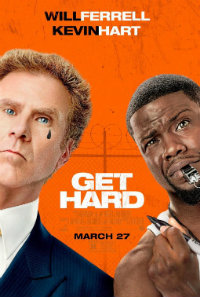The Harder They Fall: Cohen Takes Us Back To Racial Stereotypes of Yore
 Screenwriter Etan Cohen makes his directorial debut with Get Hard, a crass, generally low-brow situational adult comedy that valiantly tries to disguise its extreme lack of taste and forethought with the personas of its popular comedic stars Kevin Hart and Will Ferrell. In hindsight, maybe there’s a reason that the regular helmer of these Ferrell crafted boy child comedies Adam McKay, who gets a story credit here, didn’t oversee the project, since it never overcomes the ridiculously crippling antiquation of its initial set-up.
Screenwriter Etan Cohen makes his directorial debut with Get Hard, a crass, generally low-brow situational adult comedy that valiantly tries to disguise its extreme lack of taste and forethought with the personas of its popular comedic stars Kevin Hart and Will Ferrell. In hindsight, maybe there’s a reason that the regular helmer of these Ferrell crafted boy child comedies Adam McKay, who gets a story credit here, didn’t oversee the project, since it never overcomes the ridiculously crippling antiquation of its initial set-up.
Had this been made somewhere in the 1980s, where we saw a slew of titles grappling with topical issues of racial stereotypes like 48 Hours with Nick Nolte and Eddie Murphy, and on the comedic front, several pairings of Richard Pryor and Gene Wilder, this would have seemed regressive even then. But we’ve entered the realm where staunch opposition of anything resembling political correctness automatically asserts itself as provocative, edgy, and refreshing. Racial stereotyping is still, sadly, a topical realm of continued examination, but this scenario is so cartoonishly administered, with its basic characterizations so crudely examined that its obvious moments of well-meaningness feel accidental.
James King (Ferrell) is a successful financial investor on Wall Street, working for his soon-to-be father in-law (Craig T. Nelson). At an engagement party for his upcoming wedding to Alissa (Alison Brie), King is arrested for financial fraud. Refusing to take a plea agreement, he’s slapped with the maximum prison sentence of ten years and given thirty days to get his affairs in order before lock-up. Dazed and doofy, King consults the only black person in his realm, Darnell (Kevin Hart), the manager of a car-wash where King takes his vehicle. Since Darnell is black, King just assumes that he’s been to prison, and asks Darnell to train him for prison life. Darnell hasn’t been to prison but is desperate to secure the deposit for a home so he can move his family out of South Central. And so, the training begins.
Sure, there are several successful gags that generate a few laughs in Get Hard, and clearly Ferrell and Hart are having fun working together. Both of their signature personalities are center stage, so neither of them is really doing anything more than we’d expect to see, though increasingly, Hart seems to be gilding his manic shtick with a bit more emotional depth than we’ve previously been accustomed to (as evidenced with the more pleasant The Wedding Ringer). As compared to the pudgy idiocy of another dopey Ferrell characterization, Hart comes out on top, but it’s an empty victory.
The whole premise is harpooned on the repulsive idea that elitist white people view all black people as dangerous threats, though the slippery slope here fails to examine the blatant class issues really going on that would more likely influence such archaic notions. But even from here, the impetus for Hart’s personal conflict instigating his relationship with Ferrell is lazily drawn—his wife, played by Edwina Findley Dickerson, is an affluent nurse while he himself runs a seemingly busy car wash business. Yet they still can’t move out of their window-barred apartment in South Central where their precocious child is forced to attend a menacing public school? And what of the other black characters, a posse of hoods led by T.I. as Hart’s cousin, granted impressive sets of vocabulary but portrayed as a mass of threatening stereotypes? Cohen’s film would have us believe that we’ve not moved beyond the influences of 1991’s Boyz n the Hood, a film only its black characters are intensely familiar with while the clueless worldview of its white characters treat blacks like they’re fresh from watching news footage of the L.A. race riots. As another vintage comparison, even 1983’s Trading Places somehow seems wildly more progressive than this.
While one of the film’s more notable moments involves a fellatio training session at a posh gay brunch in Los Angeles, a scene that has many lambasting the film as homophobic (if anything, this feels like an inclusive bit of inoffensiveness, especially for those who actually have attended West Hollywood gay brunches), other affluent whites, such as the broad characterizations of Alison Brie and Craig T. Nelson (a common stand-in for the economically obsessed L.A. schlub, if you remember a supporting role in Troop Beverly Hills, 1989), are silly and amateurish. What’s more questionable about the film’s examination of promiscuity in the gay community is why Hart’s Darnell would bring his student to a brunch to practice the art of fellatio, especially as the film is set in a city where there are places to do that legally. And then, there’s Grindr, or a slew of other apps guys can consult to scratch that itch (or practice skills).
Paired with the usual presence of a soundtrack featuring current chart hits from Iggy Azalea and Nicki Minaj, Get Hard is not going to feel enjoyable for an audience that may demand a bit of narrative responsibility about its characterizations, as it feels right at home pandering to the lowest common denominator of understanding. But, hey, that’s cool, right?
★★/☆☆☆☆☆


